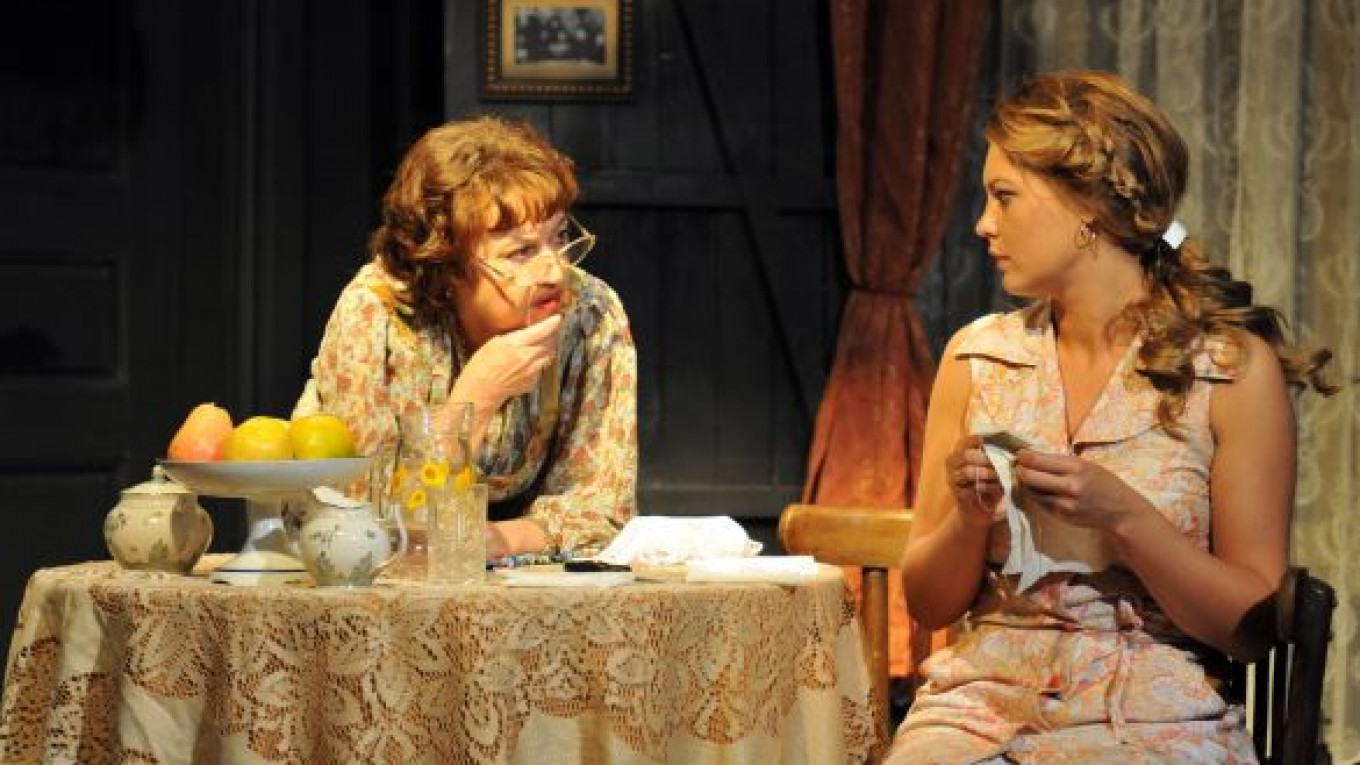The list of awards that have accrued to Lyudmila Ulitskaya over the years continues to grow. The most recent, the Simone de Beauvoir Prize, was announced in January. Her novellas (“Sonechka”), her novels (“Kukotsky’s Case”) and her screenplays have enjoyed popular and critical success. She has also been a prominent and respected commentator on social and political themes; her published correspondence with jailed tycoon Mikhail Khodorkovsky is an important social document of recent times.
Less known, perhaps, is Ulitskaya’s occasional affair with theater. In the 1980s, she worked as the literary director at the Jewish Chamber Musical Theater. Some of her plays have been staged in Moscow theaters, including “Seven Saints from the Village of Bryukho” and “Russian Jam.”
“My Grandson Veniamin,” one of her older plays, has just been unwrapped by Nina Dvorzhetskaya at the National Youth Theater.
As is fitting for this small, even sentimental, work, the performance takes place on the theater’s tiny Black Box stage. The hall is just that, a square black room that seats 50 with a shoehorn.
Designer Akinf Belov made the space as homey as could be, appointing it with armoires laden with knickknacks, tables supporting flower vases, teapots and cookies, and walls on which tiny photos bear hazy witness to a family’s past. Like the actors’ every wink or twitch, all of this is laid out at arm’s length from every spectator in the house.
There is a strong, unbending Jewish theme to this play. Fira and her cousin Liza are among the last of a family that was wiped out by a German firing squad in the Belarussian town of Bobruisk in a single day during World War II. Ever since then, Fira has been obsessed with restarting the family line. Her idea is to find a nice girl from another surviving family and marry her off to her son.
Very little in the play is nearly as grim as that, however. Fira (Natalya Ryazanova) and Liza (Natalya Platonova), though vastly different in personality, are strong, resilient, funny women. Perhaps in a way that makes sense only in a Jewish context, they are bound to each other as much by their conflicts as by what they have in common.
Fira, especially, is a firepot, a mother hell-bent not only on reviving her family line, but on controlling every move and breath that her beloved son Veniamin takes. So overwhelming is the pressure she exerts on her precious boy that he constantly flees to other cities. Veniamin, in fact, never appears in Ulitskaya’s play except as the topic of most of the women’s conversations.
None of this stops Fira from finding a suitable bride and actually seeing the marriage through to fruition, if not consummation. The fact that the groom caught a plane to Novosibirsk the night of the wedding does not seem to bother anyone except the confused bride Sonya (Maria Turova).
“My Grandson Veniamin” is a comedy of situations and the kinds of errors that earnest, well-intentioned people are wont to make. This includes the fact that Sonya eventually finds herself pregnant by a young man (Alexei Bobrov) from her hometown, with whom, she swears in an uproarious, heartfelt confession to Liza, “almost nothing happened at all.”
Things develop slowly, relying for the most part on lots of cute, intimate talk between the two aging cousins, whose fates are so similar but whose personalities and views of the world are so diverse. What Fira does not know — and what Liza refuses to tell her — is that Sonya is not the long-lost child of an old family friend at all. She is a gentile who was adopted at the age of 5. As such, the whole charade about rebuilding the family is nothing but that — a charade.
But does that mean life and love are also a sham?
Dvorzhetskaya and her cast selflessly invest this play with love and affection. The characters, especially Fira and Liza, are vivid portraits of feminine folly, wiles and wisdom. The entire cast works together as if it were, indeed, a loving family, and that is evident at every moment in the performance.
“My Grandson Veniamin” is an older play, written in the late 1980s, and there is plenty that is old-fashioned about it. The team at the National Youth Theater took that on boldly and created a show that has its cloying moments, but is always warm and filled with personality.
“My Grandson Veniamin” (Moi Vnuk Veniamin) plays Oct. 20 at 7 p.m. at the National Youth Theater, located at 2 Teatralnaya Ploshchad. Metro Teatralnaya. Tel. 692-0069. . Running time: 2 hours, 30 minutes.
A Message from The Moscow Times:
Dear readers,
We are facing unprecedented challenges. Russia's Prosecutor General's Office has designated The Moscow Times as an "undesirable" organization, criminalizing our work and putting our staff at risk of prosecution. This follows our earlier unjust labeling as a "foreign agent."
These actions are direct attempts to silence independent journalism in Russia. The authorities claim our work "discredits the decisions of the Russian leadership." We see things differently: we strive to provide accurate, unbiased reporting on Russia.
We, the journalists of The Moscow Times, refuse to be silenced. But to continue our work, we need your help.
Your support, no matter how small, makes a world of difference. If you can, please support us monthly starting from just $2. It's quick to set up, and every contribution makes a significant impact.
By supporting The Moscow Times, you're defending open, independent journalism in the face of repression. Thank you for standing with us.
Remind me later.







